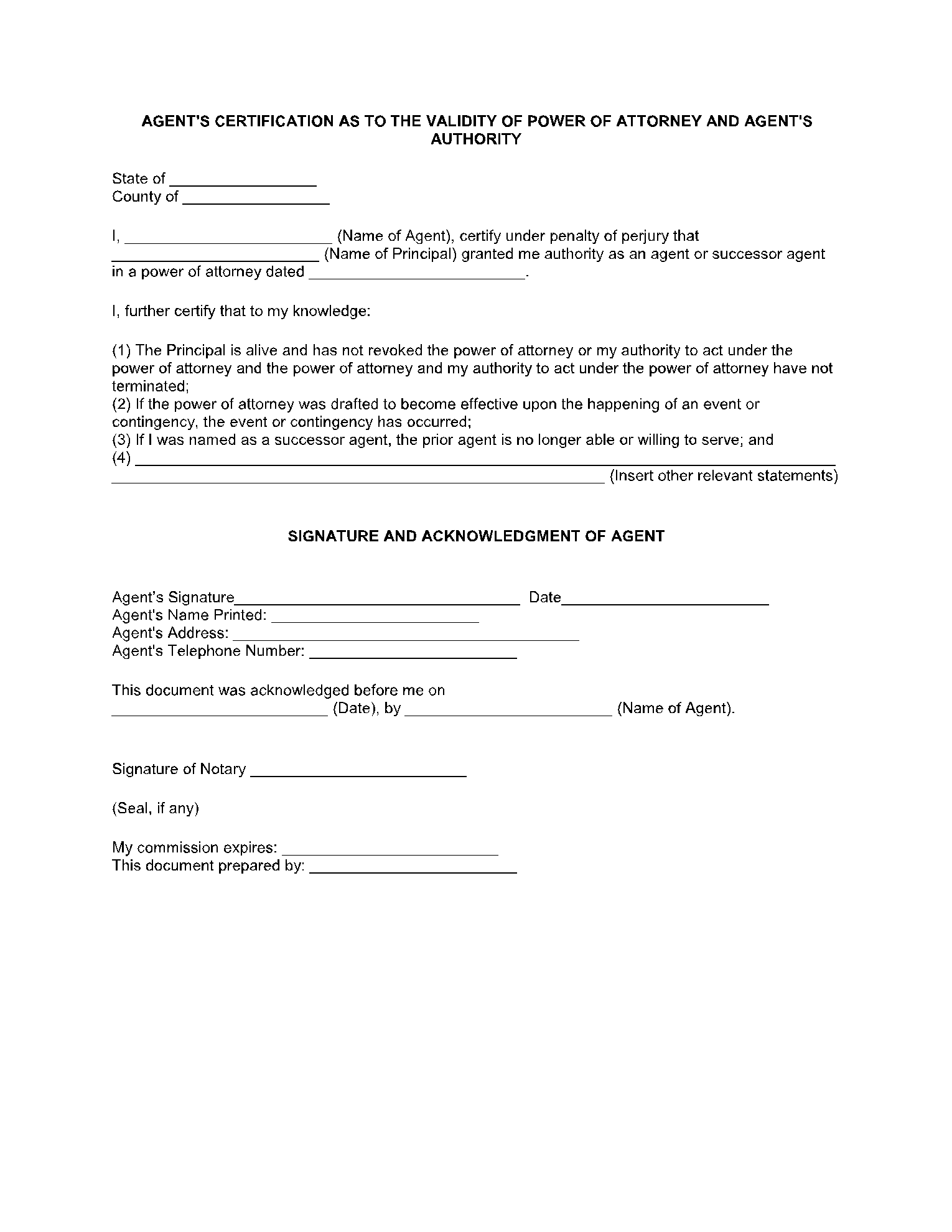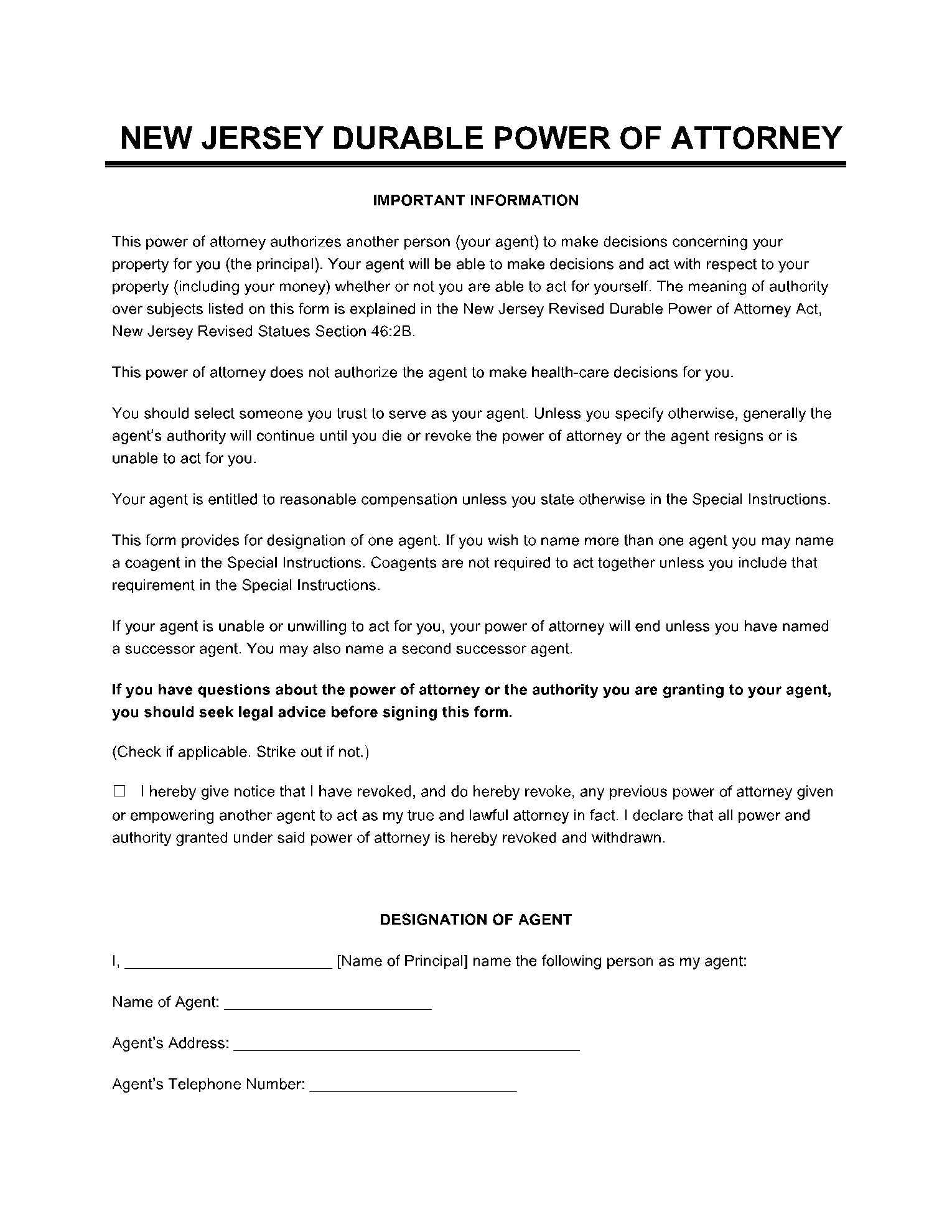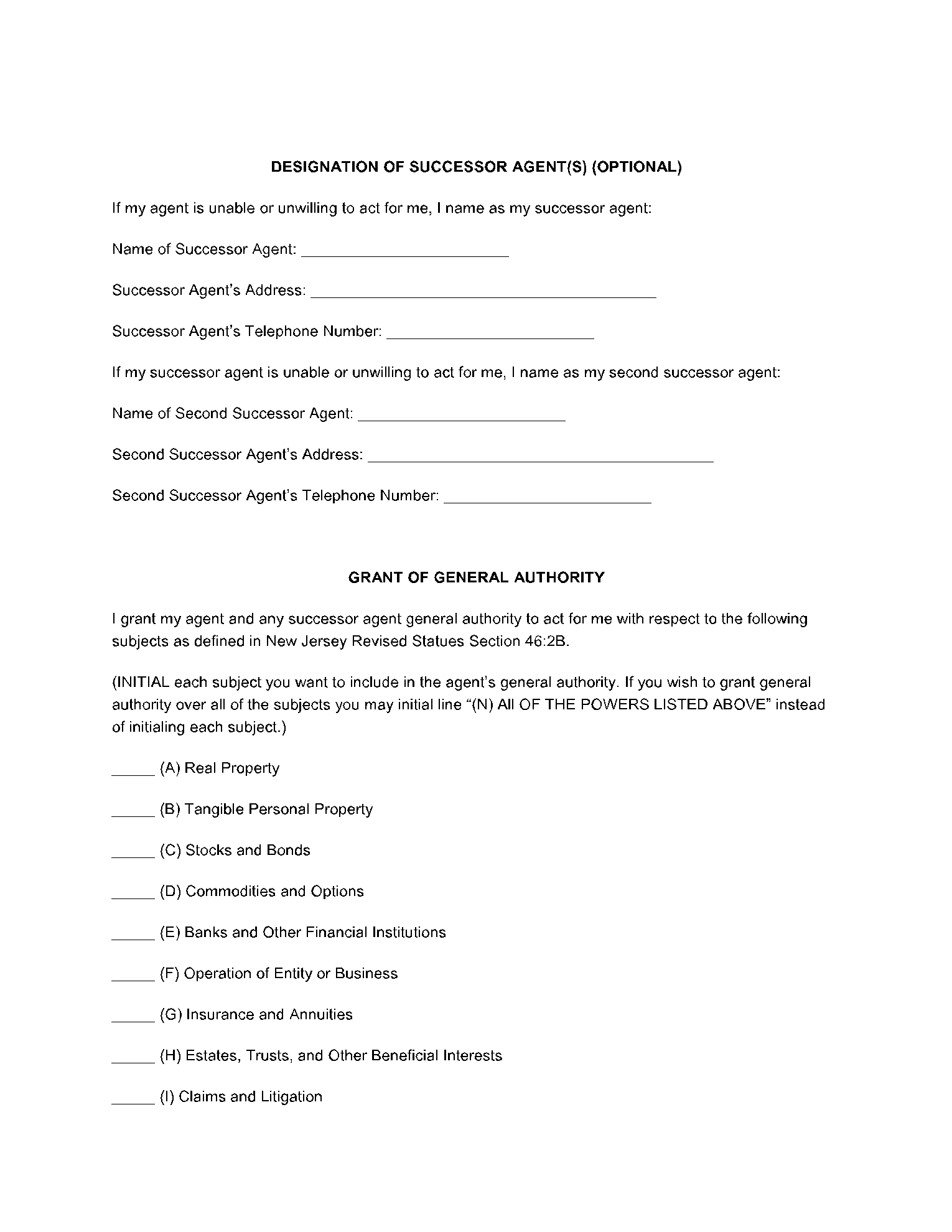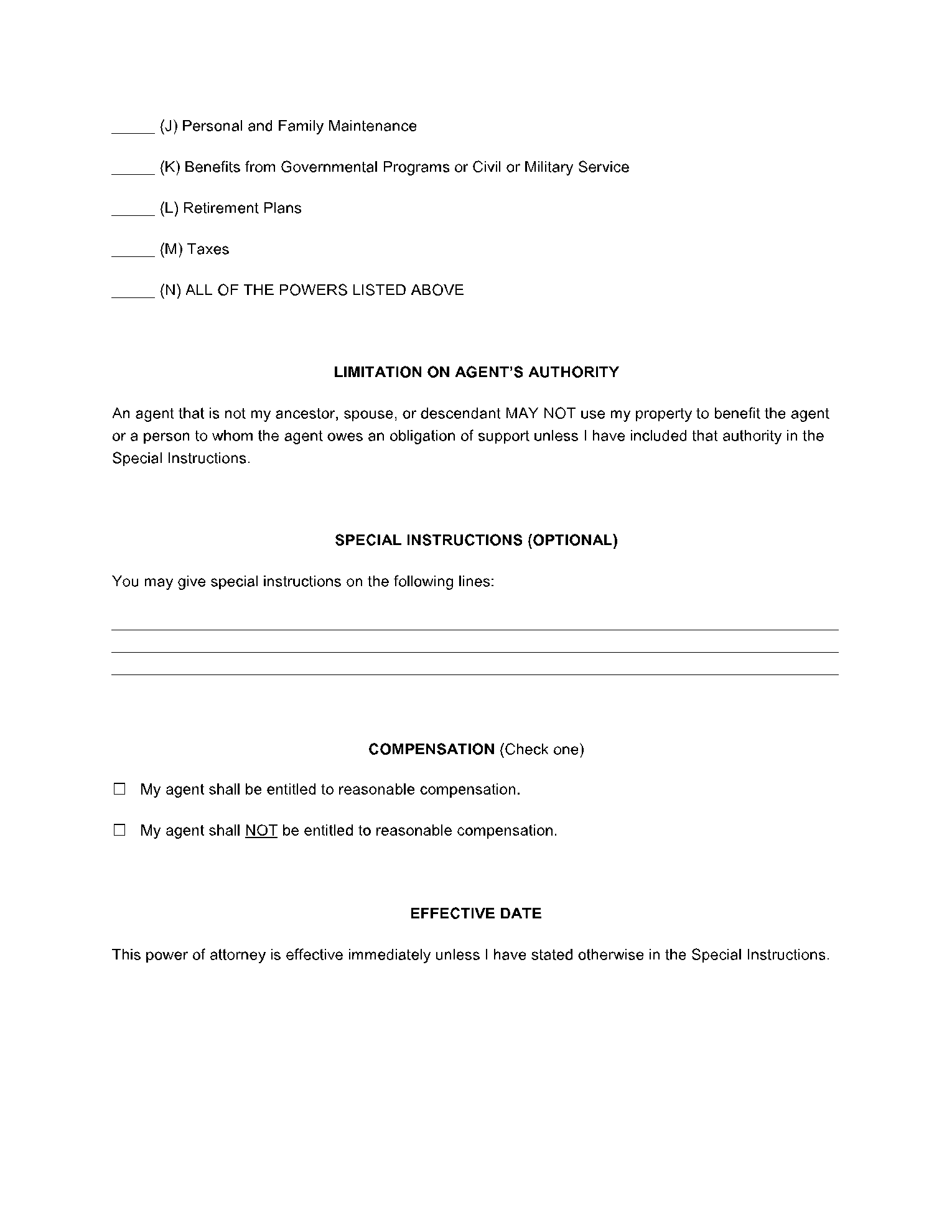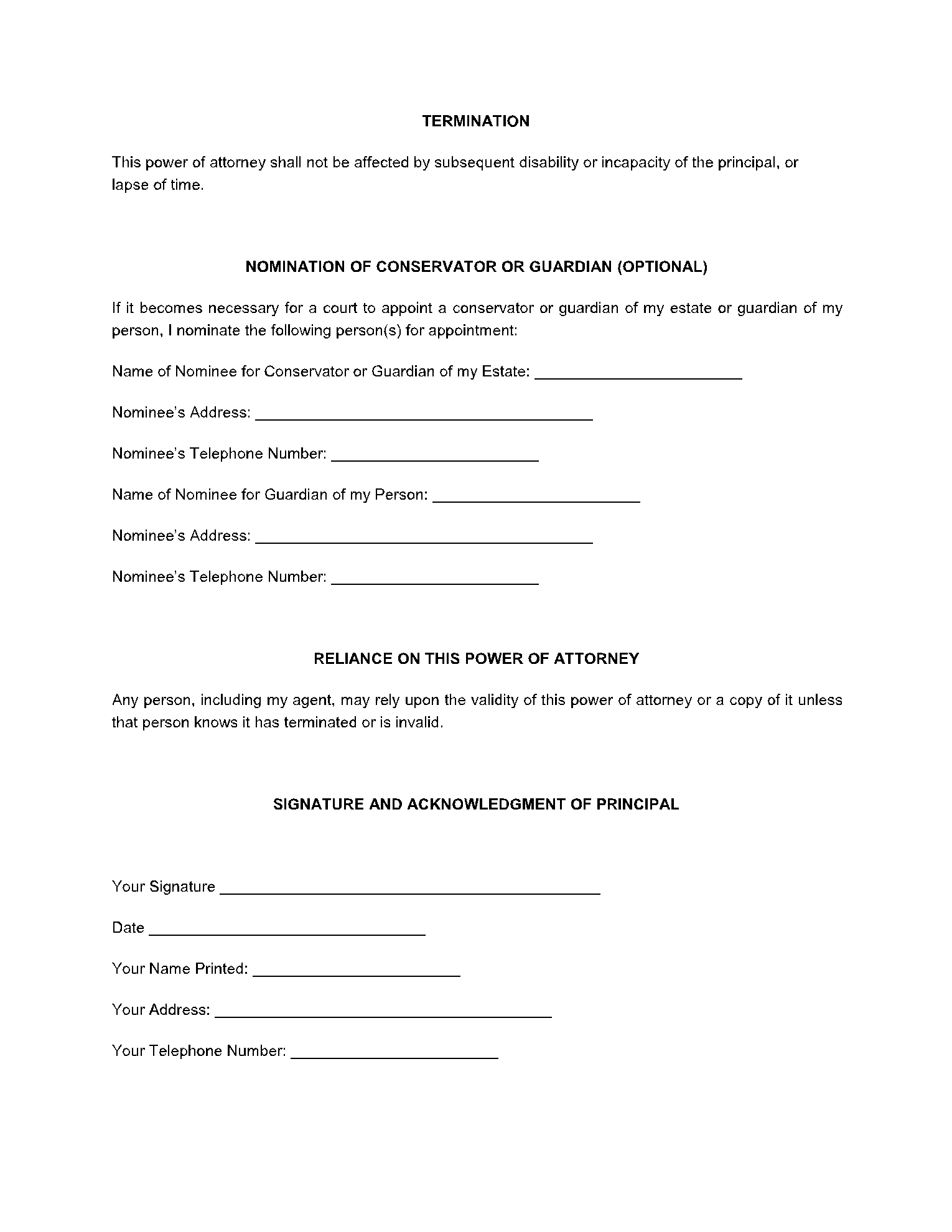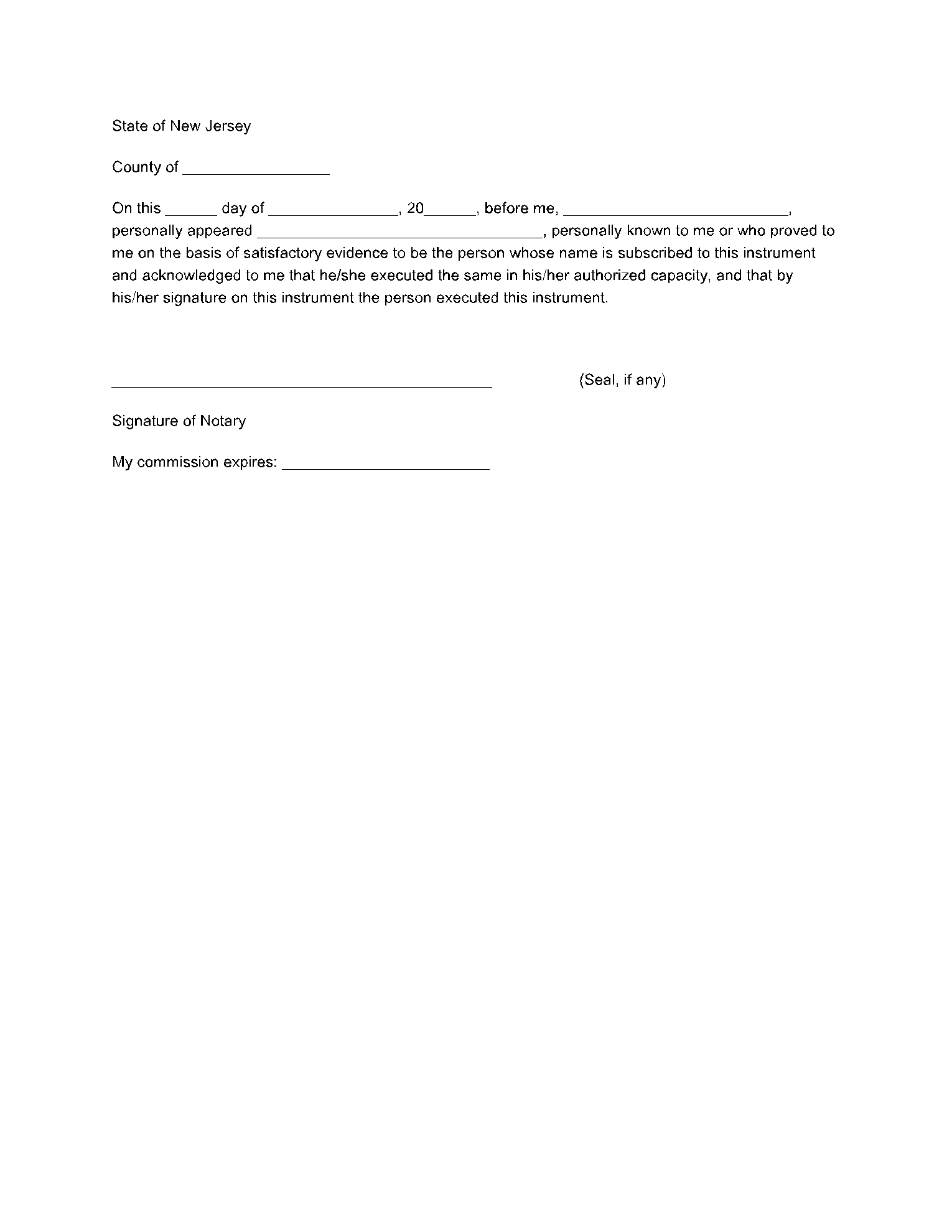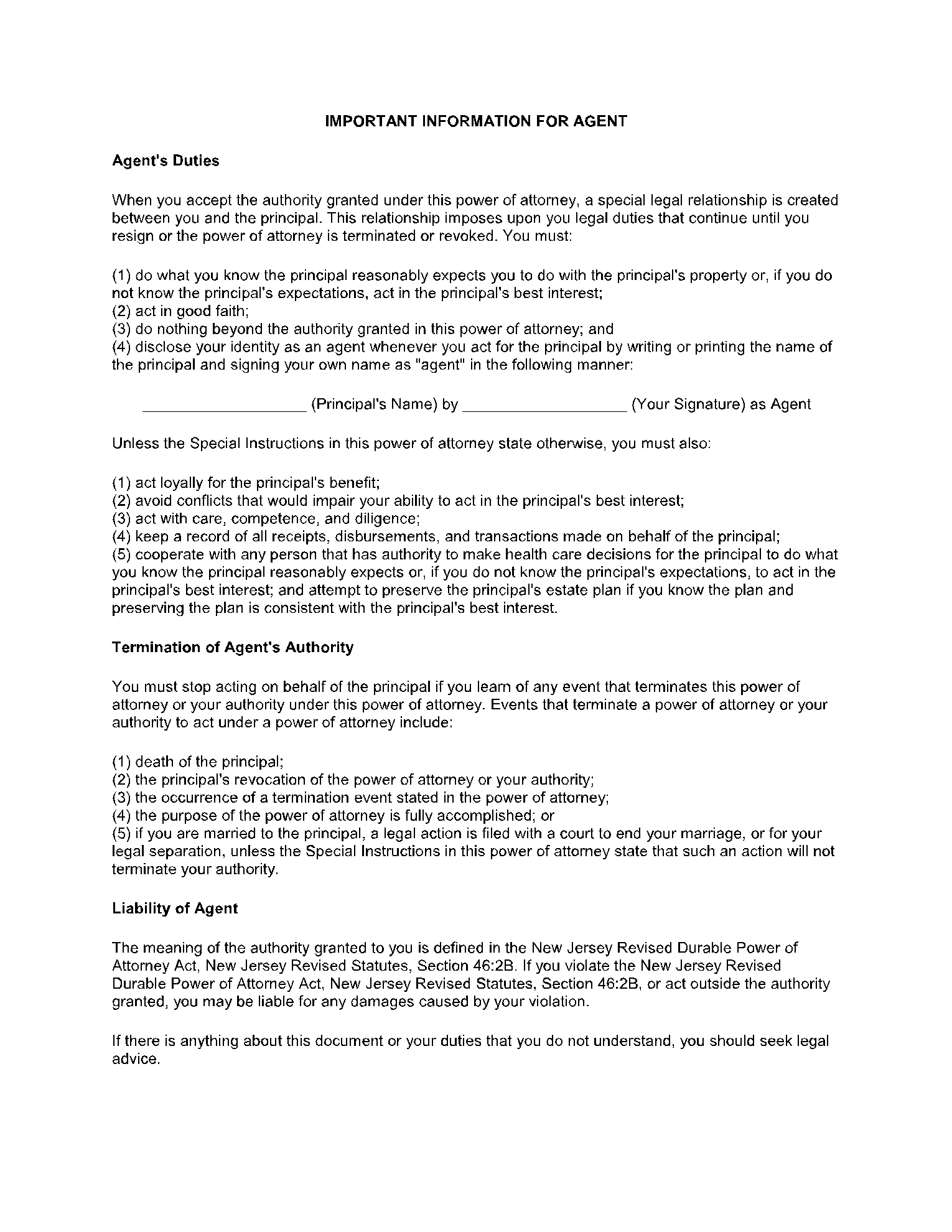In the state of New Jersey, a durable power of attorney (DPOA) is a legal document that gives an agent the power and ability to make decisions on the behest of the principal. The DPOA is drawn to handle matters related to health, finance, real estate, etc. Unlike regular POAs, the DPOAs are meant for the long-term.
Here are some of the legal components that must be incorporated in a New Jersey Durable Power of Attorney template:
-
- The form's title and the date it was signed
- Names of both the principal and agent(s)
- Contact information for both parties
- Witnesses' statements and signatures, or the signature of a notary public
- Specific powers of the attorney-in-fact should be specified.
Allow others to make life decisions for you with New Jersey power of attorney forms template
End-of-life decisions cannot be left to chance. What if they don't turn out the way you wanted them? So, use our power of attorney form New Jersey template to appoint someone you trust to make those decisions on your behalf.
Get Your Copy By Clicking Below.
What is a New Jersey Durable Power of Attorney?
Under the Advanced Directives for Health Care, section 26:2H-53, et seq., in New Jersey, a DPOA is required and often used to confer upon a chosen individual powers which s/he can use to make important decisions regarding the principal’s health care and/or end-of-life decisions.
The legal documents contain stipulations such as accepting or refusing treatment from a healthcare provider. It allows the agent to choose or refuse a particular medical procedure, patient care services, life-sustaining procedures, use of any medical device or drugs, artificial ways to maintain a vital body function, or using resuscitation methods on behalf of the principal.
How Does the New Jersey Durable Power of Attorney Work?
Filling up a New Jersey durable power of attorney form will help you in determining what powers you want the agent to have. The form lists down all the necessary information for both the principal and the agent and any future third party. DPOA can be general or very specific. The law states certain legal requirements that are to be fulfilled in a DPOA:
- The principal must be a competent adult at the time of the formulation of the DPOA.
- DPOA must be properly signed and dated.
- Witnesses present during the signing of the document must be of sound body and mind.
A DPOA can be canceled, and the power of the agent can be revoked by:
- Executing a subsequent directive canceling the DPOA
- Oral and written notification
- In the event of a divorce, when one of the spouses is the agent for another
Who Needs a New Jersey Durable Power of Attorney?
Having a DPOA can be very useful in the case when you suddenly become incapacitated due to an accident or illness, if you are a resident in New Jersey. In that case, to get your guardianship, your kin may have to go through a tiresome and expensive legal process.
Having a DPOA drawn beforehand will allow you to choose a trustworthy and able individual to act as your Agent. An NJ power of attorney form can come in effect immediately should you become debilitated.
FAQs
-
What are the requirements for the principal to create a DPOA?
To formulate a DPOA, a principal must have a clear understanding of the powers that are being granted to the Agent. If in case, the principal lacks the required mental capacity, then the DPOA cannot be drawn.
-
What powers can be granted to the agent under DPOA?
Under the New Jersey law, the Principal can confer any of the following powers onto the Agent:
- Financial transactions
- Social security benefits
- Charitable gifts
- Tax matters
- Real estate transactions
- Personal affairs
- Unemployment benefits
- Military benefits
-
Can an agent sell or rent out the property belonging to the principal?
Yes. Under DPOA, an agent can sell/rent/lease any real estate, for any term, on behalf of the Principal.
-
What are the things an agent cannot do under DPOA?
Even if the principal extends the authorization under DPOA, an agent cannot do certain things such as:
- Cannot practice law unless s/he is a licensed member of the New Jersey Bar
- Cannot sign a statement on behalf of the Principal declaring that the principal knows something confidential
- Cannot vote in an election
- Cannot draw or revoke a will for the Principal
-
Can the agent make any healthcare-related decisions even if the Principal is completely capable of doing so?
No, the Agent only obtains the responsibility/power to make any decision only after a physician has deemed that the Principal is unable or incapable of making an informed decision.
If you are planning to create a DPOA or any other kind of power of attorney, visit CocoSign and download the requisite printable power of attorney form NJ.
DOCUMENT PREVIEW
NEW JERSEY DURABLE POWER OF ATTORNEY
THE POWERS YOU GRANT BELOW ARE EFFECTIVE
EVEN IF YOU BECOME DISABLED OR INCOMPETENT
NOTICE: THE POWERS GRANTED BY THIS DOCUMENT ARE BROAD AND SWEEPING. THEY ARE EXPLAINED IN THE UNIFORM STATUTORY FORM POWER OF ATTORNEY ACT. IF YOU HAVE ANY QUESTIONS ABOUT THESE POWERS, OBTAIN COMPETENT LEGAL ADVICE. THIS DOCUMENT DOES NOT AUTHORIZE ANYONE TO MAKE MEDICAL AND OTHER HEALTH-CARE DECISIONS FOR YOU. YOU MAY REVOKE THIS POWER OF ATTORNEY IF YOU LATER WISH TO DO SO. THIS POWER OF ATTORNEY IS EFFECTIVE IMMEDIATELY AND WILL CONTINUE TO BE EFFECTIVE EVEN IF YOU BECOME DISABLED, INCAPACITATED, OR INCOMPETENT.
I ____________________________________________________________________________
_____________________________________________ [insert your name and address] appoint _____________________________________________ [insert the name and address of the person appointed] as my Agent (attorney-in-fact) to act for me in any lawful way with respect to the following initialed subjects:
TO GRANT ALL OF THE FOLLOWING POWERS, INITIAL THE LINE IN FRONT OF (N) AND IGNORE THE LINES IN FRONT OF THE OTHER POWERS.
TO GRANT ONE OR MORE, BUT FEWER THAN ALL, OF THE FOLLOWING POWERS, INITIAL THE LINE IN FRONT OF EACH POWER YOU ARE GRANTING.
TO WITHHOLD A POWER, DO NOT INITIAL THE LINE IN FRONT OF IT. YOU MAY, BUT NEED NOT, CROSS OUT EACH POWER WITHHELD.
Note: If you initial Item A or Item B, which follow, a notarized signature will be required on behalf of the Principal.
INITIAL
_______ (A) Real property transactions. To lease, sell, mortgage, purchase, exchange, and acquire, and to agree, bargain, and contract for the lease, sale, purchase, exchange, and acquisition of, and to accept, take, receive, and possess any interest in real property whatsoever, on such terms and conditions, and under such covenants, as my Agent shall deem proper; and to maintain, repair, tear down, alter, rebuild, improve manage, insure, move, rent, lease, sell, convey, subject to liens, mortgages, and security deeds, and in any way or manner deal with all or any part of any interest in real property whatsoever, including specifically, but without limitation, real property lying and being situated in the State of New Jersey, under such terms and conditions, and under such covenants, as my Agent shall deem proper and may for all deferred payments accept purchase money notes payable to me and secured by mortgages or deeds to secure debt, and may from time to time collect and cancel any of said notes, mortgages, security interests, or deeds to secure debt.
_______ (B) Tangible personal property transactions.
To lease, sell, mortgage, purchase, exchange, and acquire, and to agree, bargain, and contract for the lease, sale, purchase, exchange, and acquisition of, and to accept, take, receive, and possess any personal property whatsoever, tangible or intangible, or interest thereto, on such terms and conditions, and under such covenants, as my Agent shall deem proper; and to maintain, repair, improve, manage, insure, rent, lease, sell, convey, subject to liens or mortgages, or to take any other security interests in said property which are recognized under the Uniform Commercial Code as adopted at that time under the laws of the State of New Jersey or any applicable state, or otherwise hypothecate (pledge), and in any way or manner deal with all or any part of any real or personal property whatsoever, tangible or intangible, or any interest therein, that I own at the time of execution or may thereafter acquire, under such terms and conditions, and under such covenants, as my Agent shall deem proper.
_______ (C) Stock and bond transactions. To purchase, sell, exchange, surrender, assign, redeem, vote at any meeting, or otherwise transfer any and all shares of stock, bonds, or other securities in any business, association, corporation, partnership, or other legal entity, whether private or public, now or hereafter belonging to me.
_______ (D) Commodity and option transactions. To organize or continue and conduct any business which term includes, without limitation, any farming, manufacturing, service, mining, retailing or other type of business operation in any form, whether as a proprietorship, joint venture, partnership, corporation, trust or other legal entity; operate, buy, sell, expand, contract, terminate or liquidate any business; direct, control, supervise, manage or participate in the operation of any business and engage, compensate and discharge business managers, employees, agents, attorneys, accountants and consultants; and, in general, exercise all powers with respect to business interests and operations which the principal could if present and under no disability.
_______ (E) Banking and other financial institution transactions. To make, receive, sign, endorse, execute, acknowledge, deliver and possess checks, drafts, bills of exchange, letters of credit, notes, stock certificates, withdrawal receipts and deposit instruments relating to accounts or deposits in, or certificates of deposit of banks, savings and loans, credit unions, or other institutions or associations. To pay all sums of money, at any time or times, that may hereafter be owing by me upon any account, bill of exchange, check, draft, purchase, contract, note, or trade acceptance made, executed, endorsed, accepted, and delivered by me or for me in my name, by my Agent. To borrow from time to time such sums of money as my Agent may deem proper and execute promissory notes, security deeds or agreements, financing statements, or other security instruments in such form as the lender may request and renew said notes and security instruments from time to time in whole or in part. To have free access at any time or times to any safe deposit box or vault to which I might have access.
_______ (F) Business operating transactions. To conduct, engage in, and otherwise transact the affairs of any and all lawful business ventures of whatever nature or kind that I may now or hereafter be involved in.
_______ (G) Insurance and annuity transactions. To exercise or perform any act, power, duty, right, or obligation, in regard to any contract of life, accident, health, disability, liability, or other type of insurance or any combination of insurance; and to procure new or additional contracts of insurance for me and to designate the beneficiary of same; provided, however, that my Agent cannot designate himself or herself as beneficiary of any such insurance contracts.
_______ (H) Estate, trust, and other beneficiary transactions.
To accept, receipt for, exercise, release, reject, renounce, assign, disclaim, demand, sue for, claim and recover any legacy, bequest, devise, gift or other property interest or payment due or payable to or for the principal; assert any interest in and exercise any power over any trust, estate or property subject to fiduciary control; establish a revocable trust solely for the benefit of the principal that terminates at the death of the principal and is then distributable to the legal representative of the estate of the principal; and, in general, exercise all powers with respect to estates and trusts which the principal could exercise if present and under no disability; provided, however, that the Agent may not make or change a will and may not revoke or amend a trust revocable or amendable by the principal or require the trustee of any trust for the benefit of the principal to pay income or principal to the Agent unless specific authority to that end is given.
_______ (I) Claims and litigation. To commence, prosecute, discontinue, or defend all actions or other legal proceedings touching my property, real or personal, or any part thereof, or touching any matter in which I or my property, real or personal, may be in any way concerned. To defend, settle, adjust, make allowances, compound, submit to arbitration, and compromise all accounts, reckonings, claims, and demands whatsoever that now are, or hereafter shall be, pending between me and any person, firm, corporation, or other legal entity, in such manner and in all respects as my Agent shall deem proper.
_______ (J) Personal and family maintenance. To hire accountants, attorneys at law, consultants, clerks, physicians, nurses, agents, servants, workmen, and others and to remove them, and to appoint others in their place, and to pay and allow the persons so employed such salaries, wages, or other remunerations, as my Agent shall deem proper.
_______ (K) Benefits from Social Security, Medicare, Medicaid, or other governmental programs, or military service. To prepare, sign and file any claim or application for Social Security, unemployment or military service benefits; sue for, settle or abandon any claims to any benefit or assistance under any federal, state, local or foreign statute or regulation; control, deposit to any account, collect, receipt for, and take title to and hold all benefits under any Social Security, unemployment, military service or other state, federal, local or foreign statute or regulation; and, in general, exercise all powers with respect to Social Security, unemployment, military service, and governmental benefits, including but not limited to Medicare and Medicaid, which the principal could exercise if present and under no disability.
_______ (L) Retirement plan transactions. To contribute to, withdraw from and deposit funds in any type of retirement plan (which term includes, without limitation, any tax qualified or nonqualified pension, profit sharing, stock bonus, employee savings and other retirement plan, individual retirement account, deferred compensation plan and any other type of employee benefit plan); select and change payment options for the principal under any retirement plan; make rollover contributions from any retirement plan to other retirement plans or individual retirement accounts; exercise all investment powers available under any type of self-directed retirement plan; and, in general, exercise all powers with respect to retirement plans and retirement plan account balances which the principal could if present and under no disability.
_______ (M) Tax matters. To prepare, to make elections, to execute and to file all tax, social security, unemployment insurance, and informational returns required by the laws of the United States, or of any state or subdivision thereof, or of any foreign government; to prepare, to execute, and to file all other papers and instruments which the Agent shall think to be desirable or necessary for safeguarding of me against excess or illegal taxation or against penalties imposed for claimed violation of any law or other governmental regulation; and to pay, to compromise, or to contest or to apply for refunds in connection with any taxes or assessments for which I am or may be liable.
_______ (N) ALL OF THE POWERS LISTED ABOVE. YOU NEED NOT INITIAL ANY OTHER LINES IF YOU INITIAL LINE (N).
